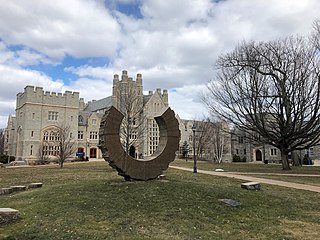In common law systems, a superior court is a court of general jurisdiction over civil and criminal legal cases. A superior court is "superior" in relation to a court with limited jurisdiction, which is restricted to civil cases involving monetary amounts with a specific limit, or criminal cases involving offenses of a less serious nature. A superior court may hear appeals from lower courts. For courts of general jurisdiction in civil law system, see ordinary court.

The Supreme Court of the State of North Carolina is the state of North Carolina's highest appellate court. Until the creation of the North Carolina Court of Appeals in the 1960s, it was the state's only appellate court. The Supreme Court consists of six associate justices and one chief justice, although the number of justices has varied. The primary function of the Supreme Court is to decide questions of law that have arisen in the lower courts and before state administrative agencies.

The University of Connecticut School of Law is the law school associated with the University of Connecticut and located in Hartford, Connecticut. It is the only public law school in Connecticut and one of only four in New England. In 2020 it enrolled 488 JD students.
The Alaska Court System is the unified, centrally administered, and totally state-funded judicial system for the state of Alaska. The Alaska District Courts are the primary misdemeanor trial courts, the Alaska Superior Courts are the primary felony trial courts, and the Alaska Supreme Court and the Alaska Court of Appeals are the primary appellate courts. The chief justice of the Alaska Supreme Court is the administrative head of the Alaska Court System.

The Connecticut Supreme Court, formerly known as the Connecticut Supreme Court of Errors, is the highest court in the U.S. state of Connecticut. It consists of a Chief Justice and six Associate Justices. The seven justices sit in Hartford, across the street from the Connecticut State Capitol. The court generally holds eight sessions of two to three weeks per year, with one session each September through November and January through May. Justices are appointed by the governor and then approved by the Connecticut General Assembly.

The Supreme Court of Georgia is the highest judicial authority of the U.S. state of Georgia. The court was established in 1845 as a three-member panel. Since 1896, the justices have been elected by the people of the state. The justices are currently elected in statewide non-partisan elections for six-year terms, with any vacancies filled through an appointment by the Governor.

In most legal jurisdictions, a supreme court, also known as a court of last resort, apex court, and highcourt of appeal, is the highest court within the hierarchy of courts. Broadly speaking, the decisions of a supreme court are not subject to further review by any other court. Supreme courts typically function primarily as appellate courts, hearing appeals from decisions of lower trial courts, or from intermediate-level appellate courts.

The Connecticut Appellate Court is the court of first appeals for all cases arising from the Connecticut Superior Courts. Its creation in 1983 required Connecticut's voters and legislature to amend the state's constitution. The court heard its first cases on October 4, 1983. The Appellate Court was also a partial successor to the former Appellate Session of the Superior Court, a court established to hear appeals in minor matters

Joette Katz is an American attorney who is a partner at the law firm, Shipman & Goodwin LLP. She was an associate justice of the Connecticut Supreme Court, where she also served as the administrative judge for the state appellate system, and later was the Commissioner of the Connecticut Department of Children and Families. In various roles during her career she has had an impact on issues of state and national importance, such as: criminal law, capital punishment, civil rights and the right to education, eminent domain, same-sex marriage, LGBTQ rights, sexual assault, sex trafficking, and helping children in state care move from institutions to families.

Barbara Louise Milano Keenan is a senior United States circuit judge of United States Court of Appeals for the Fourth Circuit and a former justice on the Supreme Court of Virginia.
Flemming L. Norcott Jr. is a former Associate Justice of the Connecticut Supreme Court. He was appointed to the Connecticut Superior Court in 1979 and remained there until his elevation to the Connecticut Appellate Court in 1987. He was appointed to the Connecticut Supreme Court in 1992. He also serves as Associate Fellow of Calhoun College at Yale University, as well as a lecturer. Justice Norcott received a Bachelor of Arts degree from Columbia University in 1965 and a Juris Doctor degree from Columbia Law School in 1968. He was born in New Haven, Connecticut.
Peter T. Zarella is a former Associate Justice of the Connecticut Supreme Court. Zarella sat on the court he was appointed by Governor John G. Rowland in January 2001 until his retirement on December 31, 2016.
The Government of Guam (GovGuam) is a presidential representative democratic system, whereby the president is the head of state and the governor is head of government, and of a multi-party system. Guam is an organized, unincorporated territory of the United States with policy relations between Guam and the US under the jurisdiction of the Office of Insular Affairs.
Kerrigan v. Commissioner of Public Health, 289 Conn. 135, 957 A.2d 407, is a 2008 decision by the Connecticut Supreme Court holding that allowing same-sex couples to form same-sex unions but not marriages violates the Connecticut Constitution. It was the third time that a ruling by the highest court of a U.S. state legalized same-sex marriage, following Massachusetts in Goodridge v. Department of Public Health (2003) and California in In re Marriage Cases (2008). The decision legalized same-sex marriage in Connecticut when it came into effect on November 12, 2008. There were no attempts made to amend the state constitution to overrule the decision, and gender-neutral marriage statutes were passed into law in 2009.
The Judiciary of California or the Judicial Branch of California is defined under the California Constitution as holding the judicial power of the state of California which is vested in the Supreme Court, the Courts of Appeal and the Superior Courts. The judiciary has a hierarchical structure with the California Supreme Court at the top, California Courts of Appeal as the primary appellate courts, and the California Superior Courts as the primary trial courts.
The judiciary of Massachusetts is the branch of the government of Massachusetts that interprets and applies the law of Massachusetts, ensures equal justice under law, and provides a mechanism for dispute resolution. The judicial power in Massachusetts is reposed in the Supreme Judicial Court, which superintends the entire system of courts.

Maria Araújo Kahn is an American lawyer who is serving as a United States circuit judge of the United States Court of Appeals for the Second Circuit. She previously served as an associate justice of the Connecticut Supreme Court from 2017 to 2023.
Christine Elyse Keller is an American lawyer and judge from Connecticut. She is a Senior Justice of the Connecticut Supreme Court.
Joan Kulowski Alexander is an associate justice of the Connecticut Supreme Court. She served as a judge the Connecticut Appellate Court from 2020 to 2022.
Melanie L. Cradle is a Judge of the Connecticut Appellate Court.









